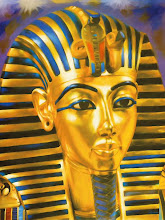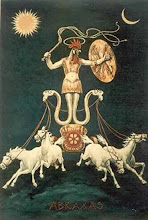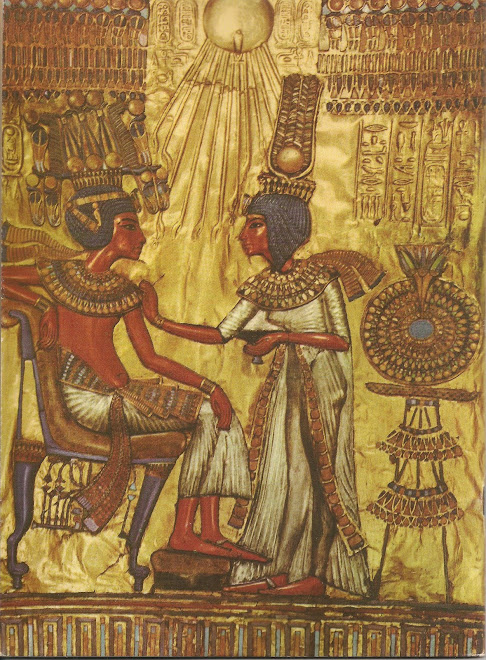Mostrar mensagens com a etiqueta qabalah. Mostrar todas as mensagens
Mostrar mensagens com a etiqueta qabalah. Mostrar todas as mensagens
sábado, 24 de dezembro de 2011
Maçonaria e Magia (The Magical Mason)
About the Author:
William Wynn Westcott (17 December 1848 – 30 July 1925) was a coroner, ceremonial magician, and Freemason born in Leamington, Warwickshire, England.[1] He was a Supreme Magus (chief) of the S.R.I.A and went on to co found the Golden Dawn.
Extract Source: http://en.wikipedia.org/wiki/William_Wynn_Westcott
More Info & Related: http://www.amazon.com/Magical-Mason-Forgotten-Hermetic-Physician/dp/0850303737/ref=sr_1_1?s=books&ie=UTF8&qid=1324748236&sr=1-1 , http://www.allbookstores.com/R-A-Gilbert/author ; http://www.librarything.com/author/gilbertra & http://pt.scribd.com/doc/24111099/R-A-Gilbert-The-Magical-Mason
Marcadores:
books,
editora pensamento,
golden dawn,
masonry,
qabalah,
R. A. Gilbert,
rosicrucianism,
William Wynn Westcott_
quinta-feira, 9 de junho de 2011
Dogma e Ritual de Alta Magia
Dogme et Rituel de la Haute Magie (Português: Dogma e Ritual de Alta Magia) foi o título do livro por Eliphas Lévi, tratado em ritual de magia, que apareceu em 1855.
Ele incluiu uma tradução do Nuctemeron (ou Nuctameron), um trabalho supostamente escrito por Apolônio de Tiana.
Em Dogme et Rituel de la Haute Magie de Lévi, foi traduzido para o Inglês por Arthur Edward Waite, como Transcendental Magic, its Doctrine and Ritual, de 1910 (Mágica Transcendental ,sua Doutrina e Ritual. Waite acrescentou um prefácio biográfico sobre Levi.
Texto retirado daqui: http://pt.wikipedia.org/wiki/Dogme_et_Rituel_de_la_Haute_Magie
Marcadores:
books,
Éliphas Lévi,
grimoires,
madras editora,
magic,
qabalah
sexta-feira, 19 de novembro de 2010
As Profecias Do Apocalipse (Cracking the Apocalypse Code)
Info About The Book Subject & Related:
The Book of Revelation is the final book of the New Testament. The title came into usage from the first word of the book in Koine Greek: apokalypsis, meaning "unveiling" or "revelation" (the author himself not having provided a title). It is also known as the Book of the Revelation of Saint John the Divine or the Apocalypse of John, (both in reference to its author) or the Book of the Revelation of Jesus Christ (in reference to its opening line) or simply Revelation, (often dubbed "Revelations" in contrast to the singular in the original Koine) or the Apocalypse. The word "apocalypse" is also used for other works of a similar nature in the literary genre of apocalyptic literature. Such literature is "marked by distinctive literary features, particularly prediction of future events and accounts of visionary experiences or journeys to heaven, often involving vivid symbolism."[1] The Book of Revelation is the only apocalyptic document in the New Testament canon, though there are short apocalyptic passages in various places in the Gospels and the Epistles.[2]
Contents
1 Authorship
1.1 Early theories
1.2 Traditional theory
1.3 Modern theories
1.4 Dating
1.5 Canonical history
2 Content
2.1 Text reconstruction
2.2 Literary structure
2.3 Narrative criticism
2.4 Figures in Revelation
3 Outline
4 Interpretations
4.1 Religious interpretations
4.1.1 Eastern Orthodox interpretation
4.1.2 Paschal liturgical interpretation
4.1.3 Seventh-day Adventist interpretation
4.1.4 Esoteric interpretation
4.1.5 Radical discipleship interpretation
4.1.6 Paschal spiritual interpretation
4.2 Aesthetic and literary interpretations
4.3 Academic interpretations
4.4 Criticism
5 Old Testament origins
6 See also
7 Notes
8 References
9 External links
( extract source: http://en.wikipedia.org/wiki/Book_of_Revelation )
Apocalypticism is the religious belief that there will be an apocalypse, a term which originally referred to a revelation of God's will, but now usually refers to belief that the world will come to an end time very soon, even within one's own lifetime. This belief is usually accompanied by the idea that civilization, as we know it, will soon come to a tumultuous end with some sort of catastrophic global event such as war. Apocalypticism is often conjoined with esoteric knowledge that will likely be revealed in a major confrontation between good and evil forces, destined to change the course of history. Apocalypses can be viewed as good, evil, ambiguous or neutral, depending on the particular religion or belief system promoting them. They can appear as a personal or group tendency, an outlook or a perceptual frame of reference, or merely as expressions in a speaker's rhetorical style.
Contents
1 Jewish apocalypticism
2 Christian apocalypticism
2.1 Jesus' apocalypticism
2.2 Year 1000
2.3 Domesday Book
2.4 Fifth Monarchy Men
2.5 Isaac Newton and the end of the world in 2060
2.6 Millerites and Seventh-day Adventists
3 Apocalypticism in Islam
4 Apocalypticism in contemporary culture
4.1 UFO Religions
4.2 Y2K
4.3 Harold Camping and his 2011 end times prediction
4.4 Mayan calendar 2012
5 See also
5.1 General
5.2 Christian premillennial apocalyptic writers
5.3 Apocalyptic movements
5.4 Millenarian cults
6 Further reading (chronological)
7 References
( extract source: http://en.wikipedia.org/wiki/Apocalypticism )
( http://www.amazon.com/Cracking-Apocalypse-Code-Gerard-Bodson/dp/1862047308 )
Marcadores:
apocalypticism,
books,
divination,
gematria,
Gérard Bodson,
prophecies,
qabalah,
the end is near,
theology
domingo, 14 de novembro de 2010
Allen Greenfield Selected Works
Info On Allen Greenfield:
Allen H. Greenfield (born 1946), also known by his ecclesiastical name Tau Sir Hasirim, is an American occultist, ceremonial magician, UFOlogist, writer, editor, and Gnostic Bishop of Ecclesia Gnostica Universalis[1] who resides in Atlanta, Georgia. His book The Story of the Hermetic Brotherhood of Light is one of the few sources of information on this subject. His book The Compleat Rite of Memphis is a comprehensive history of an Egyptian Rite of Freemasonry, and he edited an authorized, annotated edition of the work Liber Thirty-One by Charles Stansfeld Jones.
He was elected and consecrated a Bishop by the Holy Synod of the Neopythagorean Gnostic Church in 1986. In 1987 he was extended recognition as a Bishop within the Gnostic Catholic Church - Ordo Templi Orientis (OTO) and was consecrated in New York in November 1988.[2] His episcopal title "Tau" is sometimes abbreviated as "T" and prefixed to his legal name, and thus he may also be referred to as T Allen Greenfield. A former editor of the OTO journal LAShTAL, Greenfield has more recently become a critic of the Order's upper management. In February 2006, he called for their resignation and stepped down from all managerial duties in protest, issuing a strong criticism of the current Outer Head of the Order, William Breeze.[3]
A past (elected) member of the Society for Psychical Research and the National Investigations Committee on Aerial Phenomena (from 1960), he has twice been the recipient of the "UFOlogist of the Year Award" of the National UFO Conference (1972 and 1992). He is a Borderland Science Research Associate (BSRA), and has conducted on-site UFO and alien abduction investigations in Brooksville, FL, Pascagoula, MS and Brown Mountain, NC. His book Secret Cipher of the UFOnauts was reviewed by Robert Anton Wilson in his book Everything is Under Control. This review discusses how Greenfield builds on the principles established in Carl Jung's 1952 book, Flying Saucers: A Modern Myth of Things Seen in the Sky. He is also a past President of the Atlanta Science Fiction Organization (ASFOII), and the editor of the periodical The Paraufologist.
He is the father of three sons. His eldest son, Alex Greenfield, is a network television writer and producer.[4]
Quotations
"The future must be built from the best material of past and present, and on the grave of those elements in both which were/are adverse to human life and living." (quoted in Adler, p. 375)
"We are dulled by technological overload." (quoted in Adler, p. 393)
"The scientific establishment is an organized faith that contributes heavily to our present sorry state as a civilization." (quoted in Adler, p. 397)
Extract Source: http://en.wikipedia.org/wiki/Allen_H._Greenfield
More Info Related to Allen Greenfield Books:
http://www.amazon.com/Secret-Cipher-Ufonauts-Allen-Greenfield/dp/1881532046
http://www.amazon.com/Secret-Rituals-Black-Allen-Greenfield/dp/1411667646/ref=pd_sim_b_1
http://www.amazon.com/ROOTS-MODERN-MAGICK-ANTHOLOGY/dp/141161920X/ref=pd_sim_b_17
quarta-feira, 9 de junho de 2010
Thelema
Thelema is a religious[1] philosophy that was developed[2] by the early 20th century British writer and ceremonial magician Aleister Crowley. He believed himself to be the prophet of a new age, the Aeon of Horus,[3] based upon a religious experience that he had in Egypt in 1904.[1] By his account, a possibly non-corporeal being that called itself Aiwass contacted him and dictated a text known as The Book of the Law or Liber AL vel Legis, which outlined the principles of Thelema.[1][4]
Thelema is essentially a polytheistic religion, with the deities adopted from Ancient Egyptian religion, namely Nuit, Hadit and Ra-Hoor-Khuit. The faith follows the idea that the 20th century marked the beginning of the Aeon of Horus, in which a new ethical code would be followed; "Do what thou wilt shall be the whole of the Law". This statement indicated that followers, who are known as Thelemites, should seek out and follow their own True Will[5] rather than their ego's desires.[6] The religion also emphasizes the ritual practice of Magick as well as mysticism.
The word "Thelema" itself is the English transliteration of the Koine Greek noun θέλημα: "will", from the verb θέλω: to will, wish, purpose. As Crowley developed the religion, founding an organization known as the A∴A∴ to propagate it,[7] he wrote widely on the topic, producing what are collectively termed the Holy Books of Thelema. He also included into it ideas from occultism, Yoga and both Eastern and Western mysticism, especially the Qabalah.[8]
Thelemites — and other people — have interpreted and applied Crowley’s work in widely different ways,[9] sometimes leading to harsh disagreements.[10][11]
( extract source - http://en.wikipedia.org/wiki/Thelema )
Marcadores:
aeon of horus,
ancient egypt,
deities,
hermeticism,
magick,
mysticism,
occultism,
qabalah,
sex magick,
tantra,
the book of the law,
Thelema_,
yoga
Subscrever:
Mensagens (Atom)














.jpg)
.jpg)








+001.jpg)






+001.jpg)





+001.jpg)







+001.jpg)

+001.jpg)



+001.jpg)
+001.jpg)
+001.jpg)
.jpg)


